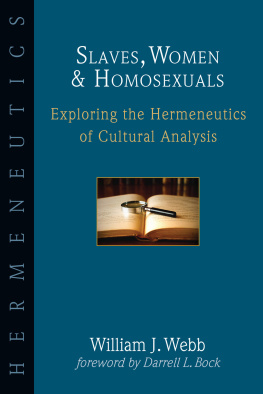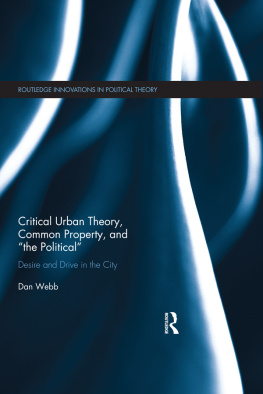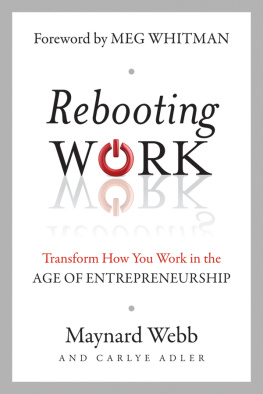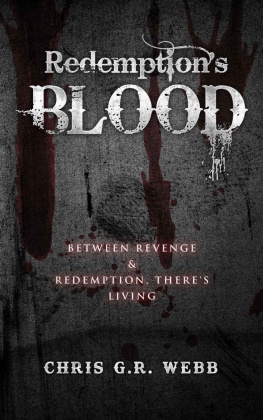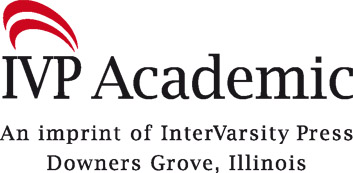SLAVES, WOMEN
& HOMOSEXUALS
Exploring the Hermeneutics
of Cultural Analysis
William J. Webb
InterVarsity Press
P.O. Box 1400, Downers Grove, IL 60515-1426
World Wide Web: www.ivpress.com
E-mail:
2001 by William J. Webb
All rights reserved. No part of this book may be reproduced in any form without written permission from InterVarsity Press.
InterVarsity Press is the book-publishing division of InterVarsity Christian Fellowship/USA, a movement of students and faculty active on campus at hundreds of universities, colleges and schools of nursing in the United States of America, and a member movement of the International Fellowship of Evangelical Students. For information about local and regional activities, write Public Relations Dept., InterVarsity Christian Fellowship/USA, 6400 Schroeder Rd., P.O. Box 7895, Madison, WI 53707-7895, or visit the IVCF website at .
All Scripture quotations, unless otherwise indicated, are taken from the Holy Bible, New International Version. NIV. Copyright 1973, 1978, 1984 by International Bible Society. Used by permission of Zondervan Publishing House. All rights reserved.
Cover illustration: Felix Manuel Burgos-Trujillo/iStockphoto
ISBN 978-0-8308-7691-4 (digital)
ISBN 978-0-8308-1561-6 (print)
This digital document has been produced by Nord Compo.
Dedicated to F. F. Bruce and Craig L. Blomberg
Together they typify egalitarians and hierarchalists
who share a redemptive-movement hermeneutic.
What they have in common far outweighs any differences.
Foreword
What do slaves, women and homosexuals have in common? Most would say their humanityand not much else. But think about the question again. Here are three groups that in one way or another, at one time or another, have been regarded as less than human. In addition, each of these groups has been at the center of theological reflection and debate in the last two centuries.
Many regard these three groups as hermeneutically equal. What we have learned about interpreting slavery texts in Scripture should be applied to our reading of biblical texts about women and homosexuals. But how do we do this? How does one approach the discussion of each group both biblically and culturally? Is the theological hermeneutics surrounding each group really the same?
Slaves, Women & Homosexuals successfully walks the reader through these hermeneutical mazes. The goal is not only to discuss how these groups are to be seen in light of Scripture but to make a case for a specific hermeneutical approach to reading relevant scriptural texts. Such an approach may enable us to think through the application of Scripture on an even broader array of topics.
This book comes with many strengths. Its case study format helps readers appreciate all the dimensions of each discussion. Juxtaposing the three topics allows one to see their similarities and differences. What I like most about this work is its balance and fairness, its truly irenic treatment of these historically contentious areas of debate. Slaves, Women & Homosexuals not only advances the discussion beyond current literature, it takes a markedly new direction toward establishing common ground where possible, potentially breaking down certain walls of hostility within the evangelical community. At the very least it lays the groundwork for a much healthier dialogue on these matters.
If, however, you want simply to have your views confirmed, then do not read this book. It is designed to make you consider why you apply Scripture the way that you dono matter what position you take. Its thoroughness is one of its major strengths, as is its proposed solution. This is serious fare for those willing to examine their beliefs, both theological and cultural, in these controversial areas.
This is precisely how the book should be read and assessed: Does this book help me think through these debated areas more clearly? I think you will conclude with me that it does. I wholeheartedly commend the book to you on that basis and thank Dr. Webb for writing it.
Read Slaves, Women & Homosexuals. Chew over its examples. Discuss them with your friends. Here is a full-course hermeneutical meal.
Darrell L. Bock
Research Professor of New Testament Studies
Dallas Theological Seminary
Acknowledgments
I consider myself most fortunate to teach in the beautiful setting of Cambridge, Ontario, in an educational environment such as Heritage Theological Seminary. This book reflects a journey of five years with fellow faculty members. In their critical interaction with my material, these faithful colleagues have been cordial and caring even when expressing points of significant disagreement. I wish to thank the entire faculty for their inputthey have enriched my life as a community of reflective academics and as a gathering of friends.
I must also express appreciation to our board, president and administrators for encouraging me as I brought this work to publication. Their leadership, expressed in practical and ideological ways, has made my theological reflection possible. My views, of course, do not represent any official seminary position; a variety of perspectives are represented at Heritage in an atmosphere of gracious deference and mutual respect.
Along the way, my students (both current and former) have made a marked contribution to my thinking and development. Their relentless and idealized pursuit of the truth always spurs me on. Special thanks to Cyril Guerette and Neal Wilson, who researched extensive portions of the appendixes. Also I am indebted to Tim Bahula for his ninth inning interaction, which led to a much-improved manuscript.
Without my supportive family this volume would never have taken shape. My wife, Marilyn, has sacrificed generously over the years for our home and ministry. She is truly my closest friend and my beloved soul mate. My brother, Robert, and my father, Bud, both scholars and teachers in their own fields, made this volume far more readable and useful to the classroom. Our broader church family, Community Fellowship in Waterloo, also helped shape this work, especially the last chapter, in a way that makes the entire work more ecclesiastically friendly.
A number of well-respected biblical scholars read through the manuscript in its emerging stages and offered valuable suggestions. I wish to thank Darrell Bock, Steve Spencer, Craig Keener, Dan Block and Craig Evans; their insights have significantly improved the final product. Of course, any remaining short-comings are of my own making.
My thanks to InterVarsity Press for accepting the manuscript for publication. Special thanks to Andy Le Peau and Gary Deddo for successfully guiding it through the editorial process. The sage prompting of Gary Deddo led to a completely new arrangement and flow for the book and a far clearer articulation of the criteria. His substantive critiques strengthened the work well beyond its original state.
The dedication of this volume to F. F. Bruce (in his memory) and to Craig Blomberg may appear somewhat strange, for it celebrates on one page and in one volume the contributions of an egalitarian advocate and a patriarchal proponent. Yet their shared hermeneutic, along with other overlapping considerations (see ), creates the possibility for a spirit of harmony between two groups who have often related in hostile and polarized ways. Blombergs use of a redemptive-spirit hermeneutic permits considerable movement toward an egalitarian position. This conceptual awakening is beginning to emerge in a number of evangelical seminaries around the worldincluding my own seminary. My prayer is that the awakening will eventually change the face of the church by producing a more unified community of Christs followers.

